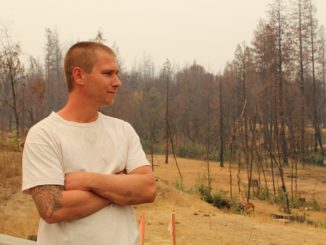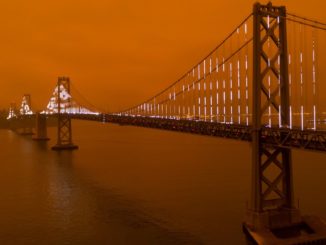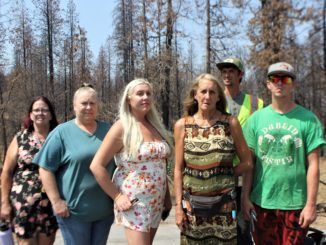
How could Butte County become the site of a wildfire-related mass casualty event less than two years after 85 people were killed by the Camp Fire? I’ve been stuck on that question since Sept. 9, the day I awoke to a Revelation-red sky and learned that the North Complex Fire had leveled Berry Creek overnight.
The day before, I’d taken a drive for the first time after having major surgery weeks earlier. I was on the south side of town in the late afternoon when I saw a giant plume of smoke hovering above the eastern foothills. My mind raced with the thought of the Ridge getting hit yet again.
The lightning-triggered blaze had been burning for weeks in Plumas County, but what I saw from the valley told me the fire was closing in.
After finding little news about its spread into Butte County, I checked Twitter and saw that the Butte County Sheriff’s Office had issued an evacuation order for Berry Creek, Brush Creek and Forbestown. That notice came suddenly. That is, BCSO hadn’t given those communities early warnings to prepare to leave.
The first thing I did was contact a friend in Paradise who’d lived through the hell of the Camp Fire. I was worried because he doesn’t have a running vehicle. I was further concerned because he didn’t have electricity that Tuesday. PG&E had cut it on Monday as a safety precaution amid searing heat and developing winds.
As I suspected, with his power out and view shrouded by pines, he didn’t know danger was afoot. I wondered how many other foothills residents were caught unawares.
Early evening, with spotty information on whether the Ridge was threatened, I gathered a few provisions, including a lantern, and drove up the hill to his home. I arrived just before sunset.
We sat on his porch, talking over the wind. Once darkness fell, the glow of the battery-operated light illuminated the trees whipping in cyclone-like patterns. I feigned composure while envisioning the fire scaling the canyon and rushing into town as it had during the Camp Fire. I steeled myself for the moment we’d need to collect his pets and race down to Chico. I returned to Twitter every couple minutes, nervously scrolling for evacuation updates.
Hours later, when it was clear that the Ridge would be spared that night, I drove home.
The next day, several residents of the evacuation zone told me they never received any official warning or order to get out. No calls, no texts, no knock on the door. They’d found out incidentally or through word of mouth. Those folks were the lucky ones. They lived. Sixteen of their neighbors perished. Fourteen of them were residents of Berry Creek, population 1,241.
How could this happen again? Another megafire, another failed evacuation, more death. The Los Angeles Times delved into that subject days later, highlighting a combination of factors: delayed response by BCSO, impediments due to power outages, and people’s reluctance to leave their homes.
I’d love to say that the North Complex Fire was a fluke and how county government is stepping up efforts to protect the public from a future blaze of this magnitude. But I’ve seen nothing to suggest that’s the case. Clearly, whatever new protocols were established post-Camp Fire were not sufficient.
Where do we go from here? My hope is that the Board of Supervisors calls for a comprehensive examination of the region’s vulnerability as well as new strategies to better inform the public during critical incidents. I’d suggest BCSO start by sending notifications about evacuation warnings and orders to residents throughout the county—not just those under imminent threat—as the recipients may be better able to pass along such messages to friends and loved ones within the affected regions. People shouldn’t have to struggle to find such information.
Speaking of difficulties, this column is my first contribution to the paper since the July issue in which I penned the main feature on the end of the criminal case against PG&E for the Camp Fire (see “Final Reckoning,” July 1). I’ve been focusing on some pressing health issues that remain the priority, so you’ll likely see this byline only sporadically in the coming months. In the meantime, thanks to those who continue to support my colleagues’ work. Your donations are critical to the CN&R’s ongoing reporting and efforts to become a sustainable enterprise.
More Camp Fire second anniversary stories:
Vision for Paradise
California will burn




Be the first to comment